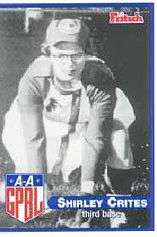Shirley Crites
Shirley L. Crites (August 21, 1934 – December 28, 1990) was an infielder who played in the All-American Girls Professional Baseball League during the 1953 season. Crites batted and threw right-handed. She was born in Cape Girardeau, Missouri.[1]
| Shirley Crites | |||
|---|---|---|---|
 | |||
| All-American Girls Professional Baseball League | |||
| Infielder | |||
| Born: August 21, 1934 Cape Girardeau, Missouri | |||
| Died: December 28, 1990 (aged 56) Phoenix, Arizona | |||
| |||
| Teams | |||
| |||
| Career highlights and awards | |||
| |||
"Squirrely", as her teammates nicknamed her, played briefly for the 1953 pennant-winning Fort Wayne Daisies. She hit a .129 average in 47 games, appearing mainly at third base as a backup to incumbent Catherine Horstman, which gave manager Bill Allington the chance to use Hortsman more as a pitcher.
Fort Wayne clinched the title with a 66–39 record, 4½ games ahead of the Grand Rapids Chicks, but lost to the Kalamazoo Lassies in the first round series. Crites went 0-for-3 in a playoff game.[2][3]
Crites is part of Women in Baseball, a permanent display based at the Baseball Hall of Fame and Museum in Cooperstown, New York, which was unveiled in 1988 to honor the entire All-American Girls Professional Baseball League.
She died in 1990 in Phoenix, Arizona, at the age of 56.[4]
Career statistics
Batting
| GP | AB | R | H | 2B | 3B | HR | RBI | SB | TB | BB | SO | BA | OBP | SLG |
|---|---|---|---|---|---|---|---|---|---|---|---|---|---|---|
| 47 | 132 | 15 | 17 | 3 | 1 | 0 | 11 | 7 | 22 | 15 | 17 | .129 | .218 | .145 |
Fielding
| GP | PO | A | E | TC | DP | FA |
|---|---|---|---|---|---|---|
| 20 | 41 | 92 | 11 | 144 | 5 | .924 |
Sources
- "All-American Girls Professional Baseball League – Shirley Crites". Retrieved 2019-03-29.
- 1953 Fort Wayne Daisies. Retrieved 2019-03-29.
- All-American Girls Professional Baseball League Record Book – W. C. Madden. Publisher: McFarland & Company, 2000. Format: Softcover, 294pp. Language: English. ISBN 978-0-7864-3747-4
- Bollinger County, Missouri Genealogy – Shirley L. Crites entry
- All-American Girls Professional Baseball League Record Book